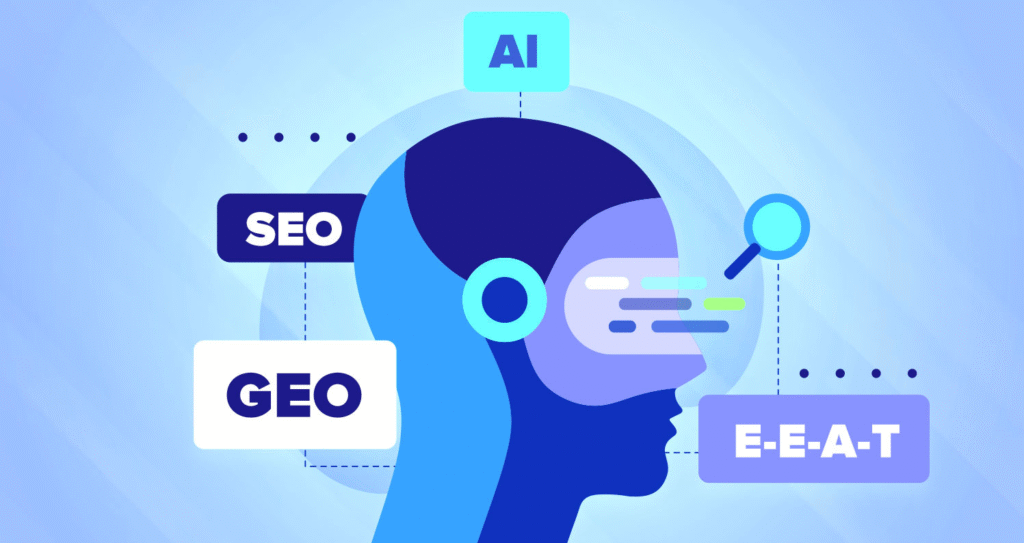Vesud, Marketing in 2025 is experiencing a fundamental shift, not just in tools, but in approach. From SEO to data governance, brands are navigating an AI-first, privacy-aware, and performance-driven landscape.
Generative Engine Optimization (GEO) The New Face of Search
Traditional SEO still plays a role, but it’s no longer the only game in town. With the emergence of generative search tools like ChatGPT, Google’s Search Generative Experience (SGE), and other AI-powered interfaces, a new priority is rising: Generative Engine Optimization (GEO).
GEO focuses on making content more discoverable in AI-generated responses rather than just on search engine result pages. That means:
- Structuring content with clarity
- Using concise, plain language
- Answering specific user questions
- Prioritizing helpfulness over keyword density
Some marketers are revisiting old pages to meet these new criteria, while others are crafting shorter, highly-focused content designed for quick AI summaries. GEO isn’t just about visibility it’s influencing how marketing teams plan, write, and assess content impact.
Technical enhancements like schema markup and modular content blocks are gaining popularity as they help AI systems recognize and retrieve meaningful information faster. The emphasis has shifted from keyword frequency to semantic clarity and intent alignment.
The Decline of Third-Party Cookies Elevates First-Party Data
With regulatory shifts and the slow sunset of third-party cookies, brands are doubling down on first-party data collection directly sourced insights from customers via websites, apps, and email interactions.
While first-party data offers more control and legal stability, it requires a clear value exchange. Brands must now offer tools, benefits, or experiences that justify user data sharing think personalized dashboards, exclusive deals, or seamless support.
The shift has also made marketers more integral to consent management, tech stack decisions, and data storage policies, roles traditionally handled by legal or IT. The result is cross-functional collaboration aimed at both compliance and trust-building.
Loyalty programs are being rebuilt with first-party data at their core. It’s no longer just about acquiring emails it’s about fostering deep, respectful customer relationships that drive long-term engagement.
AI in Ad Buying: Smarter, Faster, but Still Human-Guided
Programmatic advertising is undergoing its own AI transformation. In 2025, platforms increasingly rely on artificial intelligence to:
- Predict best-performing channels
- Automate A/B testing of ad creatives
- Optimize bids in real time
This offers marketers greater speed and cost efficiency, but also raises concerns about transparency and oversight. Many teams report a loss of insight into why certain campaigns succeed or fail.
Major platforms are embedding AI by default whether through automated bidding systems, dynamic ad creatives, or algorithm-generated reports. As a result, some agencies and brands are establishing clear boundaries: AI handles the operations, humans own the strategy.
Hybrid approaches are emerging. AI might manage real-time targeting and budgeting, while creative inputs and segmentation strategies remain under human control. This model protects brand integrity while leveraging automation for scale and speed.
The Rise of Unified Tech Stacks to Reduce Marketing Complexity
One of the biggest pain points for marketing departments has long been tool fragmentation too many platforms that don’t integrate well. In 2025, more companies are streamlining their operations with unified tech stacks.
A unified stack means consolidating platforms for:
- Content creation and delivery
- Ad management
- Analytics and reporting
- Customer engagement
Rather than searching for an all-in-one solution, brands are focusing on interoperability and integration. This reduces data silos, improves campaign agility, and enables faster, data-driven decisions.
According to CMSWire, brands are also trimming vendor lists and aligning internal team structures around their chosen stack. That reorganization helps improve efficiency and accountability, with less reliance on patchwork systems and manual processes.
Automation Enhances Speed, But Human Oversight Still Crucial
AI is playing a larger role in customer engagement, whether it’s personalized emails, chatbot interactions, or predictive product suggestions. The goal: personalization at scale, delivered faster than ever.
But marketers are learning that automation without context can miss the mark. AI might identify behavioral patterns, but it can’t yet fully understand cultural nuance, emotional tone, or long-term brand storytelling.
Brands are adapting by introducing AI editor and prompt engineering roles humans who guide and review AI-generated content to ensure it aligns with brand voice and audience expectations.
In most high-performing teams, AI is a starting point, not the final word. Drafts are refined, outputs are reviewed, and human intuition shapes the final delivery. This balance preserves authenticity while harnessing the efficiency of automation.
Key Marketing Priorities for the Rest of 2025
As the year progresses, marketers are closely watching trends in three core areas:
- Trust and Data Ethics
With privacy laws tightening in many regions, brands must handle first-party data with care offering transparency, choice, and meaningful value in return. - Generative Content Visibility (GEO)
As more users shift to AI tools for discovery, optimizing for generative engines becomes critical. That means rethinking content formats, length, and language clarity. - Brand Voice in an AI World
With AI tools creating everything from meta descriptions to ad scripts, brands are working to standardize tone and preserve personality. Internal style guides are evolving to accommodate prompt design and AI-assisted copy.
Another ongoing challenge is attribution modeling. With multi-touch campaigns spanning dozens of platforms, identifying which channel truly drove conversions is complex. Unified tech stacks and better data models help, but the need for clearer measurement frameworks remains.
Adaptability Is the New Advantage
The most successful marketing teams in 2025 aren’t those chasing every new tool they’re the ones with clear goals, flexible systems, and a deep understanding of customer needs. With AI continuing to reshape how content is created, data is used, and ads are bought, human creativity and judgment remain more vital than ever.

